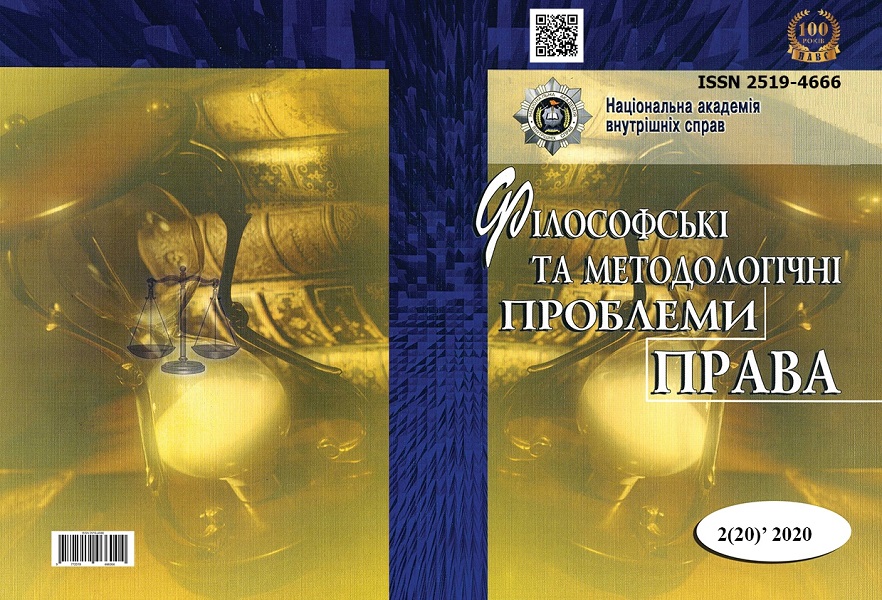Internal Law of International Organizations
Abstract
The purpose of the article is to analyze existing research on the internal law of international organizations, and to define the concept, legal nature, place of internal law of international organizations in international law on the example of the internal law of United Nations Educational, Scientific, and Cultural Organization (UNESCO). The methodological basis of the study is composed of, inter alia, comparative-legal, systemic and historical methods of scientific knowledge. Scientific novelty. The authors examine and compare key issues and doctrinal approaches to the definition, legal nature and other issues related to the internal law of international organizations, demonstrating the features and subtleties of this issue on the example of the United Nations Educational, Scientific and Cultural Organization (UNESCO). Conclusions. Having highlighted the key issues in the context of understanding the concept and essence of such a phenomenon as the internal law of international organizations, the following conclusions can be drawn: internal law of international organizations can be considered as a system of legal rules adopted by the organs of international organization on the basis of its statute to ensure its effective functioning. Despite much controversy over the place of internal law of international organizations in the system of international law, internal law is not part of domestic or public international law, but is part of international law in the broadest sense of the term. We do not agree with scholars who consider internal law in the narrow sense and do not refer the constituent acts to its sources.
Keywords: international organizations; internal law of international organizations; internal law of UNESCO; rules of procedure of UNESCO; law of international organizations.
Downloads
References
Черниченко С. В. Юридическая природа внутреннего права международных организаций. М., 1971. C. 216.
Detter I. Law making of international organizations. Stockholm, 1995. P. 47–48.
ICJ Reports, 1956. P. 97. URL: https://www.icj-cij.org/files/case-related/30/030-19561023-ADV-01-00-EN.pdf.
Kaminska N., Loshchykhin O., Romanova N. The role of the OSCE in ensuring gender equality into policies and practices.Fundamental and Applied Researches in Practice of Leading Scientific Schools. 2019. No. 34 (4). Р.87‒91. URL: https://farplss.org/index.php/journal/article/view/662. doi: 10.33531/farplss.2019.
Kaminska N., Shpakovich O., Demidenko V. Trends in the Development of International Legal Personality and Subjects of International Law: Theoretical Analysis. OPCION. Universidad del Zulia. 2018. Vol. 34. No. 87-2.
P. 507–520. URL: ttps://www.scopus.com/record/display.uri?eid=2s2.085060494215&origin=resultslist&sort =plff&src=s&st1=Trends+in+the+development+of+international+legal+personality%3a+theoretical+analysis&st2=&sid=ad6638de79b74eed02483babfeecc362&sot=b&sdt=b&sl=97&s=TITLEABSKEY%28Trends+in+the+development+of+international+legal+personality%3a+theoretical+analysis%29&relpos=0&citeCnt=0&searchTerm=.
Каминская Н. В. Влияние глобализационных тенденций на становление региональных правовых систем. Международное право. 2014. № 2. С. 20–33. doi: 10.7256/2306-899.2014.2.10941.
Лукашук И. И. Международное право. Особенная часть : учебник. М. : Волтерс Клувер, 2005. 511 с.
Маргиев В. И. Внутреннее право международных организаций : автореф. дис. … д-ра юрид. наук : 12.00.10. Казань, 1999. 282 с.
Мартиросьянц Р. Э. Правила процедуры как выражение собственной юридической воли межгосударственных организаций : автореф. дис. … канд. юрид. наук : 12.00.10. СПб., 2004. 195 с.
Моравецкий В. Функции международных организаций. М., 1976. С. 164.
Морозов Г. И. О праве международных организаций. Советское государство и право. 1972. С. 56.
Правила процедуры Генеральной Конференции ЮНЕСКО. 2018. URL: https://www.un.org/ru/documents/ rules/unesco.pdf.
Правила процедуры Исполнительного Совета ЮНЕСКО. 2018. URL: https://unesdoc.unesco.org/ark:/ 48223/pf0000261592_rus.
Пронюк Н. В. Сучасне міжнародне право : навч. посіб. Київ : КНТ, 2010. 280 с.
СарвироЮ. А. Внутреннее право международных организаций (на примере ЮНЕСКО) : автореф. дис. … канд.юрид.наук : 12.00.10. М., 2009. 188 с.
Шибаева Е. А., Поточный М. Правовые вопросы структуры и деятельности международных организаций : учеб. пособие. 2-е изд. М. : МГУ, 1988. 168 с.
Шпакович О., Шаламберідзе М. Правотворча діяльність міжнародних організацій. Науковий вісник Національної академії внутрішніх справ. 2020. № 3 (116). С. 108–114. doi: https://doi.org/10.33270/ 01201163.108.
Шпакович. О. М. Право міжнародних організацій : курс лекцій. Київ, 2020. 121 с.
Tribunal administratif. Jugement No. 2. 15 Janvier 1929. URL: https://www.ilo.org/dyn/triblex/ triblexmain.fullText?p_lang=en&p_judgment_no=.02&p_language_code=FR.
Устав Организации Объединенных Наций по вопросам образования, науки и культуры : междунар.док.от 16 нояб. 1945 г. URL: https://zakon.rada.gov.ua/laws/show/995_014.
Войціховський А. В. Міжнародне право : підручник. Харків : ХНУВС, 2020. 544 с.
Abstract views: 493 PDF Downloads: 1447
Copyright (c) 2021 Philosophical and Methodological Problems of Law

This work is licensed under a Creative Commons Attribution-NonCommercial-NoDerivatives 4.0 International License.
- Authors reserve the right to authorship of their own work and transfer to the magazine the right of the first publication of this work under the terms of the Creative Commons Attribution License, which allows other persons to freely distribute published work with mandatory reference to authors of the original work and the first publication of an article in this magazine.
- Authors have the right to enter into separate additional agreements on non-exclusive dissemination of the work in the form in which it was published in the journal (for example, to post an article in the institution's repository or to publish as part of a monograph), provided that the link to the first publication of the work in this journal is maintained.
- The journal's policy allows and encourages the posting of articles by authors on the Internet (for example, in electronic storehouses of institutions or on personal websites), both before the submission of this manuscript to the editorial office and during its editorial processing, as this contributes to the creation of a productive scientific discussion and positively affects the efficiency and dynamics of citing the published work.




